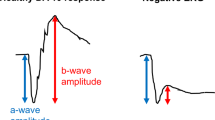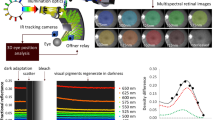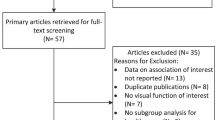Abstract
LORD RAYLEIGH noticed that his brother-in-law, Lord Balfour, had abnormal vision and he devised the Rayleigh match to examine it. In rather similar circumstances many years before, Clerk Maxwell used the Maxwell colour triangle to prove that his father-in-law lacked the fundamental red sensation.
This is a preview of subscription content, access via your institution
Access options
Subscribe to this journal
Receive 51 print issues and online access
$199.00 per year
only $3.90 per issue
Buy this article
- Purchase on Springer Link
- Instant access to full article PDF
Prices may be subject to local taxes which are calculated during checkout
Similar content being viewed by others
References
Rayleigh, Nature, 25, 64 (1881).
Stiles, W. S., Proc. Roy. Soc., B, 127, 64 (1939).
Stiles, W. S., Docum. Ophthal., 3, 138 (1949).
Stiles, W. S., Proc. Nat. Acad. Sci. Wash., 45, 100 (1959).
Mitchell, D. E., and Rushton, W. A. H., Vis. Res., 11, 1045 (1971).
Rushton, W. A. H., Powell, D. S., and White, K. D., Vis. Res. (in the press).
Author information
Authors and Affiliations
Rights and permissions
About this article
Cite this article
RUSHTON, W., POWELL, D. & WHITE, K. Anomalous Pigments in the Eyes of the Red–Green Colour Blind. Nature 243, 167–168 (1973). https://doi.org/10.1038/243167a0
Received:
Revised:
Issue Date:
DOI: https://doi.org/10.1038/243167a0
This article is cited by
-
Perception: Questions of sex and colour
Nature (1986)
Comments
By submitting a comment you agree to abide by our Terms and Community Guidelines. If you find something abusive or that does not comply with our terms or guidelines please flag it as inappropriate.



